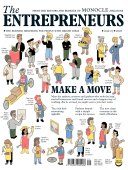
The Entrepreneurs
Smell a gap in the market? Look no further. ‘The Entrepreneurs’ is your guide to the people who have taken the leap and struck out on their own, from the club kids reinventing nightlife to the fashion brands with a simple recipe for success. Ready to join their ranks? This is where you should start.
In This Issue
Oops! No content was found.
Looks like we no longer have content for the page you're on. Perhaps try a search?
Return Home

